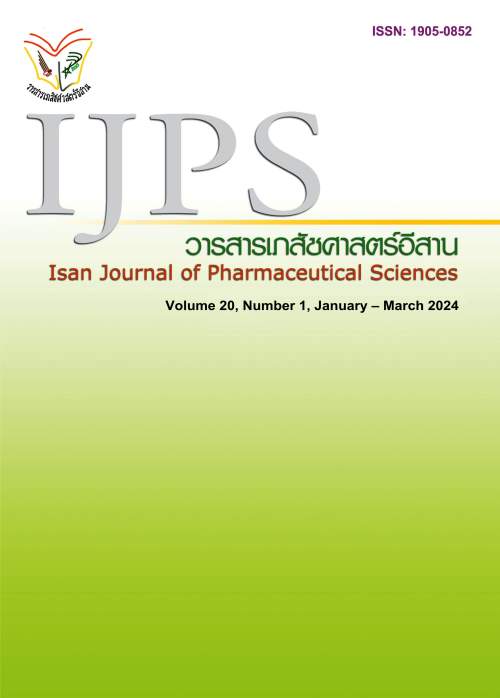Directions and Trends in Pharmaceutical Education in the Post-COVID-19 era
Main Article Content
Abstract
The pandemic of coronavirus disease 2019 (COVID-19) has affected all levels of education, including the educational management of the Faculty of Pharmacy. As a result, all curriculums of each university must be adjusted to entirely online teaching and learning while being effective for both teachers and students. Online pharmacy education during that period was either synchronous or a hybrid of synchronous and asynchronous learning by using several tools such as Zoom, Google Platform, Pro EZGC chromatogram modeler, online questionnaires, etc. Applying these tools resulted in improved learning outcomes as well as positive attitudes of students toward online learning. Although the COVID-19 pandemic has been getting better, pharmacy students and teachers still desire online learning as an integral part of the curriculum. Since students could manage their own study time and use online learning as a tool to review any lessons at their convenience. In addition, teachers also could clearly exhibit more important details in laboratory practice to all students than the large group studying in the classroom. Accordingly, continual improvement of online teaching and learning suitable to the nature of each course is required to improve the quality of education and provide maximum benefits to students sustainably as well as to prepare for upcoming crises.
Article Details

This work is licensed under a Creative Commons Attribution-NonCommercial-NoDerivatives 4.0 International License.
In the case that some parts are used by others The author must Confirm that obtaining permission to use some of the original authors. And must attach evidence That the permission has been included
References
Díez-Pascual AM, Jurado-Sánchez B. Remote Teaching of Chemistry Laboratory Courses during COVID-19. J Chem Educ. 2022;99(5):1913-22.
Elnaem MH, Nazar NIM, Rahman NSA. Pharmacotherapy virtual attachment during COVID-19 pandemic: Use of online experiential assessment in a Malaysian pharmacy school: Innovation in experiential learning or assessment. Pharm Educ. 2020;20(2):23-4.
Higbea A, Bald E, Isaacs AN, Richter SK, Stamm PL, Kassel LE. Forging ahead from adaptations of teaching during the COVID-19 pandemic: Perspectives from multiple pharmacy programs. J Am Coll Clin Pharm. 2021;4(1):101-12.
Hussain A, Chau HV, Bang H, Meyer L, A. Islam M. Performance of Pharmacy Students in a Communications Course Delivered Online During the COVID-19 Pandemic. Am J Pharm Educ. 2021;85(10):8617.
Lailaturrahmi L, Permatasari D, Badriyya E, Wahyuni FS. Google Forms as a useful tool for online formative assessment of a pharmacotherapy course in Indonesia: Innovation in learning assessment. Pharm Educ. 2020;20(2):5-6.
Lyons KM, Christopoulos A, Brock TP. Sustainable Pharmacy Education in the Time of COVID-19. Am J Pharm Educ. 2020;84(6):8088.
Ministry of Higher Education, Science, Research and Innovation. 3rd Announcement of Ministry of Highher Education, Science, Research and Innovation. Subject: Vigilant Measures againast the spread of Coronavirus (COVID-19). 2020.
Phattanawasin P, Toyama O, Rojanarata T, Laopoonpat P, Pochanakom K, Limmatvapirat C, et al. Students’ Perspectives and Achievements toward Online Teaching of Medicinal Chemistry Courses at Pharmacy School in Thailand During the COVID-19 Pandemic. J Chem Educ. 2021;98(10):3371-8.
Phunpon S, Anpaboriboon P. A survey of pharmacy students' opinions on online teaching during COVID-19 to design a new learning management approach for the Faculty of Pharmacy, Siam University. Developing Thai higher education system and mechanism for disruptive era; Bangkok 2020. p. 36-47.
Pilkington LI, Hanif M. An account of strategies and innovations for teaching chemistry during the COVID-19 pandemic. Biochem Mol Biol Educ. 2021;49(3):320-2.
Rodríguez-Rodríguez E, Sánchez-Paniagua M, Sanz-Landaluze J, Moreno-Guzmán M. Analytical Chemistry Teaching Adaptation in the COVID-19 Period: Experiences and Students’ Opinion. J Chem Educ. 2020;97(9):2556-64.
Selmin F, Eberini I, Minghetti P. Virtual wet lab practice: From a sudden crisis towards the deployment of an integrated faculty strategy: Innovation in experiential learning or assessment. Pharm Educ. 2020;20(2):9-10.
Shahba AA, Alashban Z, Sales I, Sherif AY, Yusuf O. Development and Evaluation of Interactive Flipped e-Learning (iFEEL) for Pharmacy Students during the COVID-19 Pandemic. Int J Environ Health Res. 2022;19(7):3902.
Sha'aban A, Zainal H, Noor DAM. The online teaching and learning experience for pharmacoinformatics during COVID-19: Innovation in teaching delivery or learning technology. Pharm Educ. 2020;20(2):p 37 - 8.
Singhal MK. Facilitating Virtual Medicinal Chemistry Active Learning Assignments Using Advanced Zoom Features during COVID-19 Campus Closure. J Chem Educ. 2020;97(9):2711-4.
Strawbridge J, Hayden JC, Robson T, Flood M, Cullinan S, Lynch M, et al. Educating pharmacy students through a pandemic: Reflecting on our COVID-19 experience. Res Social Adm Pharm. 2022;18(7):3204-9.
Usach I, Nácher A, Taléns-Visconti R. Adaptation of the degree in pharmacy to the distance learning. 3rd International Conference on Education and New Learning Technologies July 5-6, 2021. p. 4997-5001.
Valle-Suárez RM, Calderón-Mendoza GL, Lanza-Sorto NA, Ponce-Rodríguez HD. Teaching Instrumental Analytical Chemistry in the Framework of COVID-19: Experiences and Outlook. J Chem Educ. 2020;97(9):2723-6.
Wannaprapha T, Wutthiwan W, Rukrermwong J. Educational technology with new normal in education. NPUJ. 2020;10(3):124-34.


